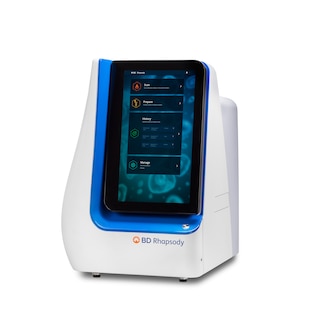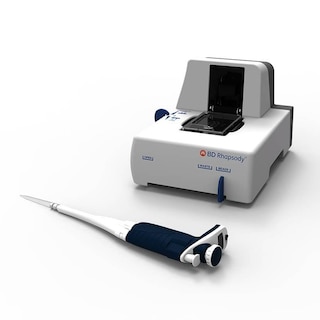-
Your selected country is
Middle East / Africa
- Change country/language
Old Browser
This page has been recently translated and is available in French now.
Looks like you're visiting us from {countryName}.
Would you like to stay on the current country site or be switched to your country?


Oligo Mouse Anti-Human CD62P
Regulatory Status Legend
Any use of products other than the permitted use without the express written authorization of Becton, Dickinson and Company is strictly prohibited.
Preparation And Storage
Recommended Assay Procedures
Put all BD® AbSeq Reagents to be pooled into a Latch Rack for 500 µL Tubes (Thermo Fisher Scientific Cat. No. 4900). Arrange the tubes so that they can be easily uncapped and re-capped with an 8-Channel Screw Cap Tube Capper (Thermo Fisher Scientific Cat. No. 4105MAT) and the reagents aliquoted with a multi-channel pipette.
BD® AbSeq tubes should be centrifuged for ≥ 30 seconds at 400 × g to ensure removal of any content in the cap/tube threads prior to the first opening.
Product Notices
- This reagent has been pre-diluted for use at the recommended volume per test. Typical use is 2 µl for 1 × 10^6 cells in a 200-µl staining reaction.
- Source of all serum proteins is from USDA inspected abattoirs located in the United States.
- Caution: Sodium azide yields highly toxic hydrazoic acid under acidic conditions. Dilute azide compounds in running water before discarding to avoid accumulation of potentially explosive deposits in plumbing.
- The production process underwent stringent testing and validation to assure that it generates a high-quality conjugate with consistent performance and specific binding activity. However, verification testing has not been performed on all conjugate lots.
- Illumina is a trademark of Illumina, Inc.
- Please refer to http://regdocs.bd.com to access safety data sheets (SDS).
- Please refer to bd.com/genomics-resources for technical protocols.
- For U.S. patents that may apply, see bd.com/patents.
Companion Products






The AC1.2 monoclonal antibody specifically binds to CD62P. CD62P is a 140 kDa type I transmembrane glycoprotein that is also known as P-Selectin, Platelet activation-dependent granule membrane protein (PADGEM), or GMP-140. P-Selectin is stored in the α-granules of platelets and the Weibel-Palade bodies of endothelial cells, and is rapidly transported to the plasma membrane upon activation. P-Selectin may mediate the initial adhesive interactions of neutrophils and monocytes with endothelium in inflammatory responses, and of activated platelets to neutrophils and monocytes in hemostasis.
Development References (8)
-
Carmody MW, Ault KA, Mitchell JG, Rote NS, Ng AK. Production of monoclonal antibodies specific for platelet activation antigens and their use in evaluating platelet function.. Hybridoma. 1990; 9(6):631-41. (Clone-specific: Flow cytometry). View Reference
-
Crovello CS, Furie BC, Furie B. Rapid phosphorylation and selective dephosphorylation of P-selectin accompanies platelet activation.. J Biol Chem. 1993; 268(20):14590-3. (Clone-specific: Immunoprecipitation, Radioimmunoassay). View Reference
-
Etingin OR, Silverstein RL, Hajjar DP. Identification of a monocyte receptor on herpesvirus-infected endothelial cells.. Proc Natl Acad Sci USA. 1991; 88(16):7200-3. (Clone-specific: Flow cytometry). View Reference
-
Kansas GS. Selectins and their ligands: current concepts and controversies. Blood. 1997; 88(9):3259-3287. (Biology). View Reference
-
Kishimoto T. Tadamitsu Kishimoto .. et al., ed. Leucocyte typing VI : white cell differentiation antigens : proceedings of the sixth international workshop and conference held in Kobe, Japan, 10-14 November 1996. New York: Garland Pub.; 1997.
-
Larsen E, Celi A, Gilbert GE, et al. PADGEM protein: a receptor that mediates the interaction of activated platelets with neutrophils and monocytes.. Cell. 1989; 59(2):305-12. (Immunogen: Immunoaffinity chromatography, Immunoprecipitation, Radioimmunoassay, Western blot). View Reference
-
Pigott R, Power C. The Adhesion Molecule Facts Book. 1993:173.
-
Schlossman SF. Stuart F. Schlossman .. et al., ed. Leucocyte typing V : white cell differentiation antigens : proceedings of the fifth international workshop and conference held in Boston, USA, 3-7 November, 1993. Oxford: Oxford University Press; 1995.
Please refer to Support Documents for Quality Certificates
Global - Refer to manufacturer's instructions for use and related User Manuals and Technical data sheets before using this products as described
Comparisons, where applicable, are made against older BD Technology, manual methods or are general performance claims. Comparisons are not made against non-BD technologies, unless otherwise noted.
For Research Use Only. Not for use in diagnostic or therapeutic procedures.
Report a Site Issue
This form is intended to help us improve our website experience. For other support, please visit our Contact Us page.